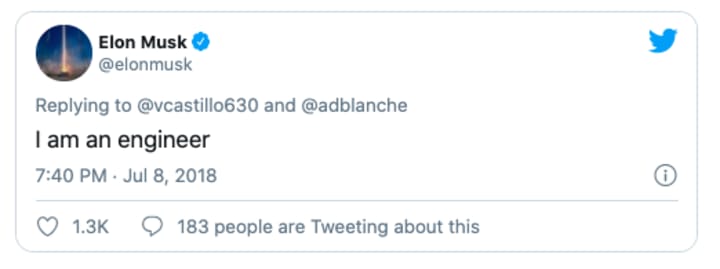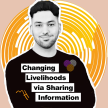Elon Musk’s One Attribute Most People Fail to Acknowledge
He’s the man of a single book.

Elon Musk, a crystal clear name, who might not even need an introduction, has self-explanatory attributes. But I want to introduce him. That’s because I’ve read about him many times but have noticed that many writers have missed some salient features.
This article aims to unleash a key attribute of Elon Musk, i.e., he is the man of a single book. Is he so? If yes, how and why it’s necessary to acknowledge his key attribute?
I want to introduce him at five levels*: Elon Musk 101, 110, 220, 340, 400, and 520 — from Intro to Elon Musk to Advanced Elon Musk.
*Note: 101, 110, 220, 340, 400, and 520 are symbolic and not identical to subject-specific course levels students take at colleges and universities.
Elon Musk 101
At this level, I provide an overview of Elon Musk.
The South African-born American entrepreneur, Elon Musk, was once “so lost in his daydreams about inventions that his parents and doctors ordered a test to check his hearing.” Yet, they were wrong. They didn’t know him. Many people don’t know him even now — the way they need to know.
Who is Elon Musk?
Titles:
- A centibillionaire who arrived with $2000 in Canada at 17, and is now the richest person globally and the highest-paid CEO ever.
- A Business Magnet and an Industrialist, whom countries hire “to get to the outer space.”
- The Founder, CEO, and lead designer of SpaceX who once “wanted to purchase cheap rockets from Russia, but returned empty-handed,” and founded SpaceX.
- The CEO, Product Architect of Tesla Inc, who is known as “the longest tenured CEO of any automotive manufacturer globally.”
- The Founder of the Boring Company, who was “stuck in traffic,” and tweeted that he would make machines to build tunnels.
- The Cofounder of Neuralink, who established it “to merge the human brain with AI.”
- The Cofounder of OpenAI, who wants to develop “safe artificial intelligence to benefit humanity.”
- The Cofounder of Zip2, which was established to provide and license “online city guide software to newspapers,” with a 10% contribution from his Dad, and was later on sold to Compaq Computer for $305 million.
- The Founder of X.com, which was merged with Cofinity Inc, later changed to PayPal and then purchased by eBay.
- The Chairman of SolarCity which was founded by his cousins based on his advice in 2006, but is now a subsidiary of Tesla.
- The man who has envisioned building the Hyperloop, to make traveling possible “at over 700 miles an hour.”
Education:
- He completed high school in South Africa.
- He studied at the University of Pretoria in South Africa for five months and moved to Canada to skip military services in South Africa.
- He studied at Queens University in Ontario but left it after two years.
- He completed his BA in Physics and BA in Economics at the University of Pennsylvania.
- He began studying for his Ph.D. at a graduate program at Stanford University but quit it after two days.
A few unusual facts about him:
- When a kid, he “tried taekwondo, karate, judo and Brazilian jiu-jitsu.”
- At the age of 9, he read the entire Encyclopedia Britannica.
- At the age of 10, he read 10 hours per day.
- At the age of 12, he coded a video game and sold it for $500
- Until the age of 15, he was consistently bullied at school.
- At the age of 17, he lived with one dollar and ate hot dogs and oranges.
- Later on, he used to work as a cleaner in a boiler room for $18 per hour and did many other odd jobs.
- He sold computer parts from the dorm.
- He had applied for a job in Netscape but never received a response.
- He took a 6-month course in 3 days.
- He had a “strained relationship with his father.”
- He holds three citizenships.
- He is scared of Google and Artificial Intelligence.
- He neither has a master’s nor a Ph.D.
Elon Musk 110
The more we get into higher levels, the more specific it gets. At the 101 level, Elon Musk might seem both the jack and the master of all trades. But at this level, I would like to show you that Elon Musk is not the master of all. He may be a jack of all trades.
If Friedrich Nietzsche, the prominent German philosopher, lived now, he would say that Elon Musk’s core competence and field of interest has disappeared under the interpretation. That’s because he has a famous saying: “the text has disappeared under the interpretation.”
What we might be missing about Elon Musk relates to the above quote of Nietzche. Although we give him so many titles (See Elon Musk 101), he identifies himself as none of the above. Instead, he relates himself to something else:
“I’m an engineer, so what I do is engineering. That’s what I’m good at.” — Elon Musk

What is more surprising is that he does not have any formal education in engineering. He neither did any bachelor's nor master’s in engineering.
How is it possible to be an engineer without a degree? He once gave a hint:
“(Physics is) a good framework for thinking.”
To some extent, his earlier education in Physics provides a blueprint for his thinking and works described at level 101. But to view Elon Musk from a more concrete lens, we have to move to another level, i.e., Elon Musk 220.
Elon Musk 220
Although Elon Musk is a jack of all trades (i.e., he has founded and co-founded many companies), he is the master of one. That one field is ‘Engineering.’ But the engineering that Elon Musk has mastered is somewhat different since he didn’t study engineering in college.
During my research about him, I found two reasons he has mastered this field without even pursuing a formal degree.
Reason One: He “was raised by Books.”
No matter Elon Musk worked as a cleaner for $18 an hour or as an intern in a Bank for $14 an hour; no matter he studied physics and economics, or quit his Ph.D. at Stanford, he consistently learned things through books.
He mostly read engineering and physics books because it was his dream to become an expert in this field. He is not an aerospace engineer through college education, but he has done things thousands of aerospace engineers wouldn’t even think. Before establishing Space X, he “literally taught himself rocket science by reading textbooks and talking to industry heavyweights.”
Unlike most of us, he became a man of success by reading books. But the books that he was raised by were not only related to engineering. According to CNBC, Elon Musk “credits his success” to the following eight books:
- “Structures: Or Why Things Don’t Fall Down” by J.E. Gordon
- “Benjamin Franklin: An American Life” by Walter Isaacson
- “Einstein: His Life and Universe” by Walter Isaacson
- “Superintelligence: Paths, Dangers, Strategies” by Nick Bostrom
- “Merchants of Doubt” by Erik M. Conway and Naomi Oreskes
- “Lord of the Flies” by William Golding
- “Zero to One: Notes on Startups, or How to Build the Future” by Peter Thiel
- The “Foundation” trilogy by Isaac Asimov
Here is a list of sixty-one books that Elon Musk recommends.
Reason Two: He allots 80% of his time into engineering and design.
In an interview with Sam Altman, the President of Y Combinator, he was asked what takes most of his time at work. He responded that he allots 80% of his schedule to engineering and design. He said that he knows the A-Z and the nuts and bolts of engineering. He lets others take care of finance, administration, and everything else:
“I think a lot of people think I must spend a lot of time with media or on businessy things. But actually almost all my time, like 80% of it, is spent on engineering and design. Engineering and design, so it’s developing next-generation product. That’s 80% of it.” — Elon Musk
Elon Musk 340
What does it mean to be the man of a single book? And why is Elon Musk the man of a single book?
One way to answer this question would be to see it from the lens of St. Thomas Aquinas’ famous saying:
“Beware the man of a single book.”
This quote has often been misinterpreted. If you interpret it correctly, you’re going to know that one attribute of Elon Musk instantly. But I refrain from interpreting it. I want to show how others have interpreted it.
On page 246 of the 624-page literary collection titled The Portable Twentieth-Century Russian Reader, Clarence Brown identifies two ways to interpret this quote.
1. “[Aquinas’s] words are generally quoted today in disparagement of the man whose mental horizons are limited to one book.”
2. A man “who has thoroughly mastered one good book can be dangerous as an opponent.”
Although we might agree with both interpretations, what Thomas Aquinas meant is closer to the second interpretation theme.
So, someone who has mastered one book (one discipline, one field/occupation, or one interest area) cannot be compared to someone who knows cross-cutting fields. Why? Because the person with one book has mastered the book (occupation) thoroughly, and the person with many books has limited knowledge of the books (occupations).
He is the man of a single book because he focuses on ‘making stuff.’
The main task of an engineer is to:
“apply the principles of science and mathematics to develop economical solutions to technical problems. Their work is the link between scientific discoveries and the commercial applications that meet societal and consumer needs.”
We discussed that Elon Musk considers himself an Engineer and spends 80% of his working hours on engineering and design. We also discussed that he was raised by books. At this level, you’ve to know that his focus is merely on ‘making stuff,’ which is possible through engineering.
This is not only Elon Musk’s actual job but his advice to others too. He believes that the smartest people go to finance and law, which is not good:
“We should have fewer people doing law and fewer people doing finance and more people making stuff.” — Elon Musk
The reason why Elon Musk is the man of a single book is that he has mastered engineering on his own, he considers himself as an engineer, his major time is allotted to engineering and design — not to mention that he was raised by engineering books and that his father was also an Engineer.
Elon Musk 400
So far, we unfolded many dimensions about Elon Musk, but what makes him stand out in the crowd of other engineers, entrepreneurs, and innovators? It relates to the following points (but not necessarily only bound to these):
a) He produces and offers ‘compelling’ products and services, respectively.
Elon Musk believes that engineers, entrepreneurs, and all those interested in ‘making stuff’ have to focus on ‘compelling’ products and services. He focuses on products and services through creativity and innovation, which is, of course, orchestrated by engineering. He says:
“I believe you’ve got to have a compelling product at the end of the day. Otherwise, you’re just going to address a very small segment of the population that cares enough to suffer through this horrible product. And it’s just never going to scale.” — Elon Musk
Almost all of the companies that he founded provide/provided either a compelling product or a service.
b) He has got a different understanding of time.
An ordinary Engineer might favor an 8–5 or 40 hours week job, but Elon Musk has “developed a relentless work ethic [and is] known to work as many as 80 to 100 hours per week.”
“We all worked 20 hours a day, and he worked 23 hours.” — Julie Ankenbrandt, his co-worker at X.com
What’s fascinating is that his understanding of time is very different from many of us. He was inspired by Peter Tiel, his PayPal co-founding partner, primarily through his book, which he says is one of the eight books that substantially impacted him. Although a like-minded person, Tiel was probably the smartest in the room. In a way, this belief of Tiel might have influenced Musk too:
“You should take your 10-year life plan and ask, Why can’t I do this in six months?”
c) He networks with others and builds great teams.
Elon Musk is not the master of everything, but it doesn’t mean he didn’t network with other masters. If he didn’t build “a network of the smartest people,” he wouldn’t have become a man of success.
In an interview with Alison van Diggelen, he once said:
“A company is a group of people that are organized to create a product or service. That’s what a company is. So in order to create such a thing, you have to convince others to join you in your effort.”
Elon Musk 520
This is an advanced level Elon Musk you might not be able to study at the moment — although you’ve taken the prerequisites.
Elon Musk 520 is merely about the unexplored, soon-to-be-explored, and even an inexplicable version of Elon Musk. We don’t know what his future products and services are. We don’t know about his future moves. We don’t know how else he might surprise the world. Let it be uncertain. Of course, anything he will develop in the future would be tied to his core competence, i.e., Engineering.
From his childhood till now, he has always sought new opportunities as he believed: “He wanted to go to America as a young kid because that’s where ‘all the cool stuff’ was happening. He wanted to be where the biggest developments were happening.”
Can we discuss some outside material? Alright.
Is Elon Musk a genius? Perhaps. Did he borrow these extraordinary skills and knowledge from his ancestors? That might hold true. But he is definitely not an alien.
In his piece on “Genetic Memory: How We Know Things We Never Learned,” the late Dr. Darold Treffert once wrote:
“Whether called genetic, ancestral or racial memory, or intuitions or congenital gifts, the concept of a genetic transmission of sophisticated knowledge well beyond instincts, is necessary to explain how prodigious savants can know things they never learned.”
We’ll leave this discussion for some other sessions. Make sure to do more research on this.
Since you’ve become an expert on Elon Musk, you can now do some research independently. Think about this: “How Elon Musk’s Failures Contributed to His Success.” Do some research about his failures. You might learn new lessons. Make sure to share it with others if you find them of value.
Final Thoughts and Key Takeaways:
Next time you introduce Elon Musk to someone, introduce him 20% as all those things described under (Elon Musk 101), and 80% as an Engineer. That’s because he calls himself an Engineer, he is shaping the world through engineering, and most of his time is spent on the engineering sides of his companies — not to mention that he learned engineering on his own.
What if Jeff Bezos knew nothing about sales. What if Warren Buffet knew nothing about investing and stocks. What if Bill Gates didn’t have math and programming skills? What if Mark Zuckerberg didn’t have computer skills? You can go on with thousands of what-ifs, but at the end of the day, you’re going to find out that they had mastered one key area, one key skill, and one key discipline.
In the preceding sections about Elon Musk, we found out that:
- He does not have a college degree in engineering. He is a Stanford dropout.
- He is a self-proclaimed Engineer.
- He focuses 80% of his schedule on engineering and design.
- He is unpredictable, and we don’t know about his upcoming plans.
- He believes in the width of life, not only its length, as he might squeeze a 10-year plan into a 6-month plan — just like the 6-month course he took in 3 days.
- He connects with highbrows and builds agile teams.
- He works hard and smart.
- He uses entrepreneurship as a tool to sell his engineering products and services to change our livelihoods.
- He did many jobs and learned different skills, but he always kept his “engineering dream” alive.
- He urges everyone to embrace creativity and innovation if they want to see some tangible and considerable impact, now and in the future.
- He urges that we all have to focus more on “making stuff.”
The main takeaway from this article would be that he is the man of a single book, or in other words, Elon Musk is an uncommon Engineer — who learned engineering on his own through books. Without engineering, things wouldn’t have uncovered like this.
Let’s end this article with a piece of wisdom from a Greek Philosopher:
“Each man is capable of doing one thing well. If he attempts several, he will fail to achieve distinction in any.” — Plato
---------------------------------------------------------------------------------
Note: This article was originally published on Medium by the Author.
About the Creator
Massùod Hemmat
Writer, Thinker, Social & Business Entrepreneur, CEO, AI & IR Consultant, Polymath, & Global citizen.
-
LinkedIn: /in/mhemmat
Twitter: @massuodhemmat
Medium: mhemmat.medium.com
Instagram: Masudh7
TikTok: Masud.h7
-
I write because it isn't there.






Comments
There are no comments for this story
Be the first to respond and start the conversation.